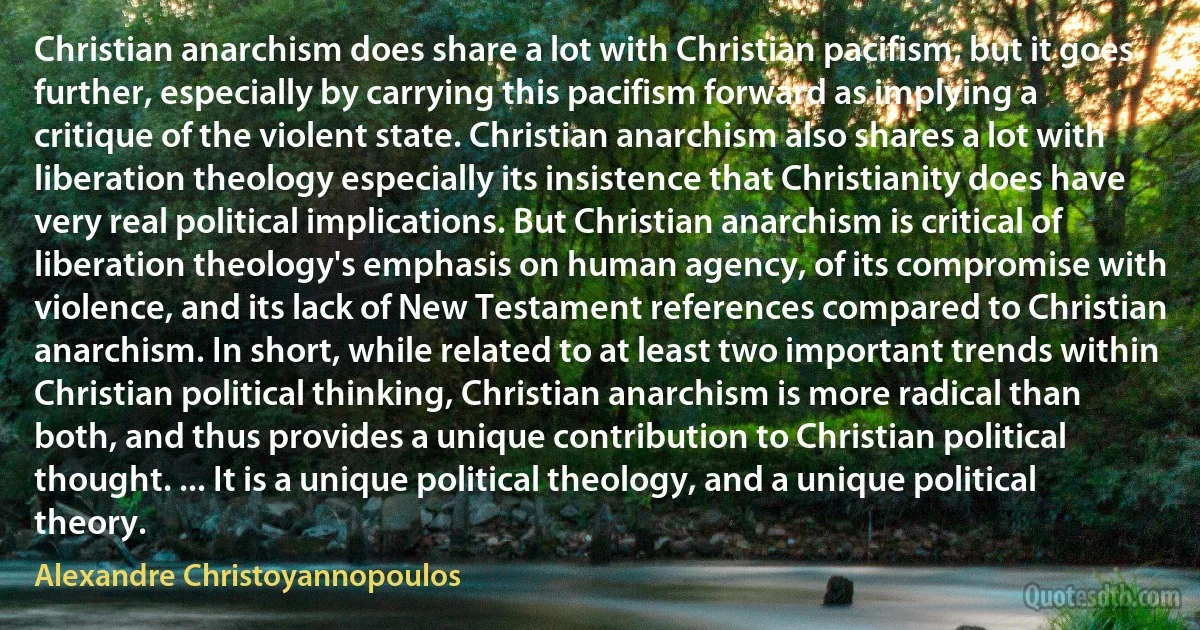
Christian anarchism does share a lot with Christian pacifism, but it goes further, especially by carrying this pacifism forward as implying a critique of the violent state. Christian anarchism also shares a lot with liberation theology especially its insistence that Christianity does have very real political implications. But Christian anarchism is critical of liberation theology's emphasis on human agency, of its compromise with violence, and its lack of New Testament references compared to Christian anarchism. In short, while related to at least two important trends within Christian political thinking, Christian anarchism is more radical than both, and thus provides a unique contribution to Christian political thought. ... It is a unique political theology, and a unique political theory.
Alexandre ChristoyannopoulosRelated topics
anarchism carrying christian compromise critique emphasis forward human implying insistence lack least liberation real share short state theology thought thinking thus unique while pacifismRelated quotes
Economists, like everyone, have their political biases, but these are by no means as strong an influence on what they are willing to consider as you might think. For example, one might have thought that strongly liberal economists like, say, James Tobin would be at least mildly sympathetic to the views of radical economists who draw their inspiration from Marx, or of heterodox economic thinkers like Galbraith. After all, in such fields as history and sociology the Marxist or post-Marxist left has long received a respectful hearing. And yet you don't find this happening: liberal economists are almost as quick as their conservative colleagues to condemn heterodox leftist ideas as foolish it was the liberal Robert Solow, not Milton Friedman, who defended orthodoxy in the bitter "capital controversy" with British radicals.

Paul Krugman
Christianity has functioned for the normative self-understanding of modernity as more than a mere precursor or a catalyst. Egalitarian universalism, from which sprang the ideas of freedom and social solidarity, of an antonomous conduct of life and emancipation, of the individual morality of conscience, human rights, and democracy, is the direct heir to the judaic ethic of justice and the Christian ethic of love. This legacy, substantially unchanged, has been the object of continual critical appropriation and reinterpretation. To this day, there is no alternative to it. And in the light of the current challenges of a postnational constellation, we continue to draw on the substance of this heritage. Everything else is just idle postmodern talk.

Jürgen Habermas
As a graduate student at Yale, I studied the whole of Christian theology but focused my attention on the Darwinian controversies. I wanted to get to the root of the conflict between Darwinian evolution and Christian doctrine. In the course of my research I learned (to my surprise) that biblical chronology played almost no role in the 19th- century controversies, since most theologians had already accepted geological evidence for the age of the earth and re-interpreted the days in Genesis as long periods of time. Instead, the central issue was design. God created the cosmos with a plan in mind. This affirmation is among the most basic in all of Christianity (and other theistic religions as well, including Unificationism). And that plan included human beings as the final outcome of the creative process: we are created in the image of God.

Jonathan Wells
I do not believe that our friends at the South have any just idea of the state of feeling, hurrying at this moment to a pitch of intense exasperation, between those who respect their political obligations, and those who apparently have no impelling power but that which a fanatical position on the subject of domestic Slavery imparts. Without discussing the question of right - of abstract power to secede - I have never believed that actual disruption of the Union can occur without blood; and if, through the madness of Northern Abolitionists, that dire calamity must come, the fighting will not be along Mason's and Dixon's line merely. It [will] be within our own borders, in our own streets, between the two classes of citizens to whom I have referred.

Franklin Pierce
Let us not despair; it is a blessed cause, and success, ere long, will crown our exertions. Already we have gained one victory; we have obtained, for these poor creatures, the recognition of their human nature, which, for a while was most shamefully denied. This is the first fruits of our efforts; let us persevere and our triumph will be complete. Never, never will we desist till we have wiped away this scandal from the Christian name, released ourselves from the load of guilt, under which we at present labour, and extinguished every trace of this bloody traffic, of which our posterity, looking back to the history of these enlightened times, will scarce believe that it has been suffered to exist so long a disgrace and dishonour to this country.

William Wilberforce
